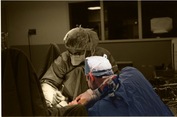|
This article was originally published on LinkedIn on August 5, 2018. One week ago, tomorrow, the FDA issued a Safety Communication slamming the use of energy-based devices for the indications of "vaginal rejuvenation" - "an ill-defined term" - "sometimes used to describe non-surgical procedures intended to treat vaginal symptoms and/or conditions including, but not limited to:
Vaginal laxity Vaginal atrophy, dryness, or itching Pain during sexual intercourse Pain during urination Decreased sexual sensation" The document stated that there are two problems: 1. "To date, we have not cleared or approved for marketing any energy-based devices to treat these symptoms or conditions, or any symptoms related to menopause, urinary incontinence, or sexual function." 2. "The treatment of these symptoms or conditions by applying energy-based therapies to the vagina may lead to serious adverse events, including vaginal burns, scarring, pain during sexual intercourse, and recurring/chronic pain." The document lists two references:
The first of these references was written in 2007, almost a decade before these energy-based devices ever existed. It obviously makes no mention of any energy-based device nor any mention of the treatment of any of the vaginal symptoms listed in the current FDA document. The second reference, published in mid-2016, was essentially a clarification of the FDA approval language for fractional CO2 lasers in gynecology drafted by the American College of Obstetricians and Gynecologists. This document stated that the FDA had not approved these lasers for the indication of vulvovaginal atrophy (VVA) and that preliminary observational data had shown some potential benefits with the use of this technology in treating patients with VVA. It made no mention of any adverse events. This document listed 6 references, 3 of which were short term clinical studies of this technology for VVA, and none of which made mention of any of the adverse events listed in the current FDA document. To summarize, the FDA has proof that energy-based devices are being marketed for indications that were not part of the FDA approval, and the FDA has no proof that the use of these energy-based devices for these indications is causing any of the serious adverse events listed in their Safety Communication. I have been involved as both a user and a consultant to the industry on these devices since their FDA approval. I have extensive training, education, and experience in the treatment of vaginal atrophy, urinary incontinence, vaginal laxity, and lasers. I am consulted when physicians have problems with these technologies and the problems have never been related to adverse events. I have witnessed the explosion of marketing for these indications by the industry and I am very well aware of the paucity of data to support the use of these technologies for these indications. However, in my experience, these technologies work well in carefully selected patients. I haven't seen the serious adverse events listed in the Safety Communication. I have conducted and attended professional conferences on the topic of these technologies, constantly review the literature, and constantly consult with both experts and neophytes in these technologies and haven't heard of physicians experiencing the serious adverse events listed in the Safety Communication. So from where did this list of adverse events originate? I can only speculate that this list has been carried over from other applications of CO2 laser technology that did not involve fractional ablation or the relatively low energy settings used in the vagina. These machines have the capability to do more than fractional laser ablation of the vagina. They are designed for multiple uses all over the body. Certainly, if misused intentionally, they hold the capability to burn tissue severely. However, and despite the fact that out-of-control marketing has put these devices into the hands of physicians with little or no training in the indications or the technologies in question, there is no evidence that I am aware of that we are in the midst of a laser vagina trauma epidemic. One would expect a perfect storm of morbidity under such conditions. To the contrary, the current lack of adverse reports would suggest that these devices used as recommended are idiot-proof. Would the FDA withhold proof of serious adverse events in a Safety Communication? Highly unlikely. There would be no motive. Especially, at the present time, when the FDA is proudly launching it's Medical Device Safety Action Plan. If anything, such proof would only add emphasis to their statement. A relevant example, would be a recent Safety Communication against injectable silicone published 9 months ago where the references offer ample proof of serious adverse events associated with that product. In my opinion, the main risk of these technologies to patients, is the lack of an expected treatment effect. Expectations should be based on both personal and published experience, patient counseling, and intimate knowledge of the conditions being treated and of the techniques and technologies being considered. This is the essence of solid clinical judgement. In their own words, "The FDA does not have the authority to: Regulate a physician's or nurse's practice. FDA does not tell providers what to do when running their business or what they can or cannot tell their patients. Make recommendations for individual doctors, clinics, or home care agencies. Conduct or provide a rating system on any regulated medical devices." However, it is their duty to make physicians and the public "aware" and "understand" issues related to product safety and effectiveness for the uses for which they are approved. An overzealous allusion to adverse effects unsubstantiated by data is out of place and does not a perfect storm make when all that can be seen are clear skies.
1 Comment
Your comment will be posted after it is approved.
Leave a Reply. |
AuthorMarco A. Pelosi, III, MD, is a cosmetic gynecologist, surgeon, lecturer & cofounder of the ISCG. You may contact him directly at [email protected] Archives
April 2020
Categories
All
|
We are ISCG |
Get to Know Us |
Stay Connected |



 RSS Feed
RSS Feed
